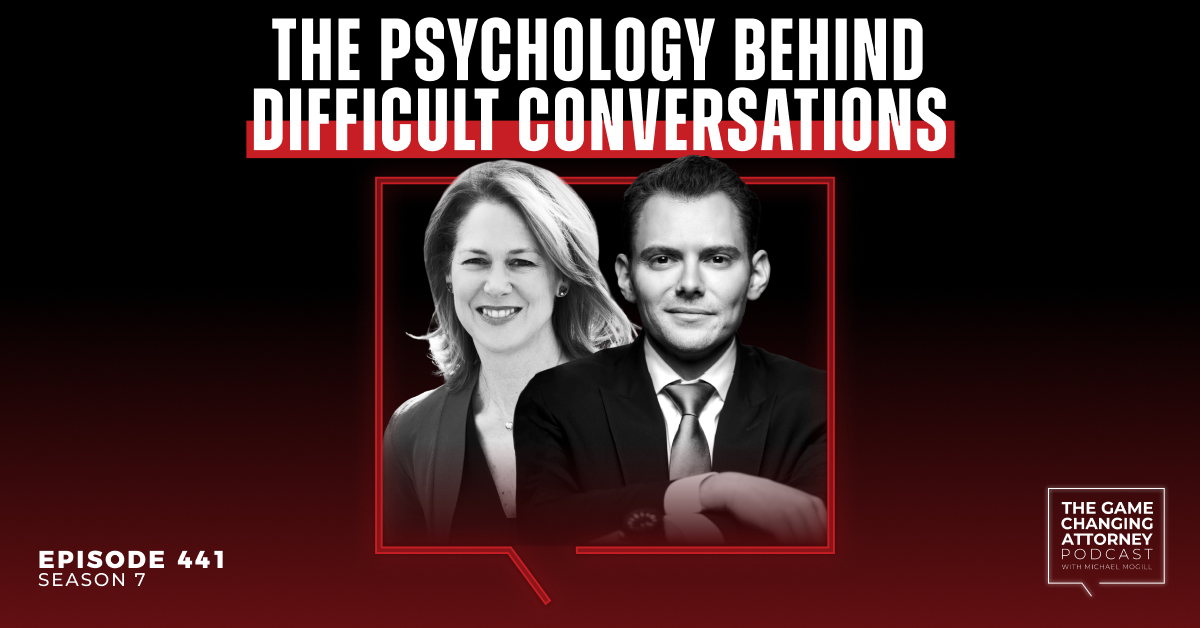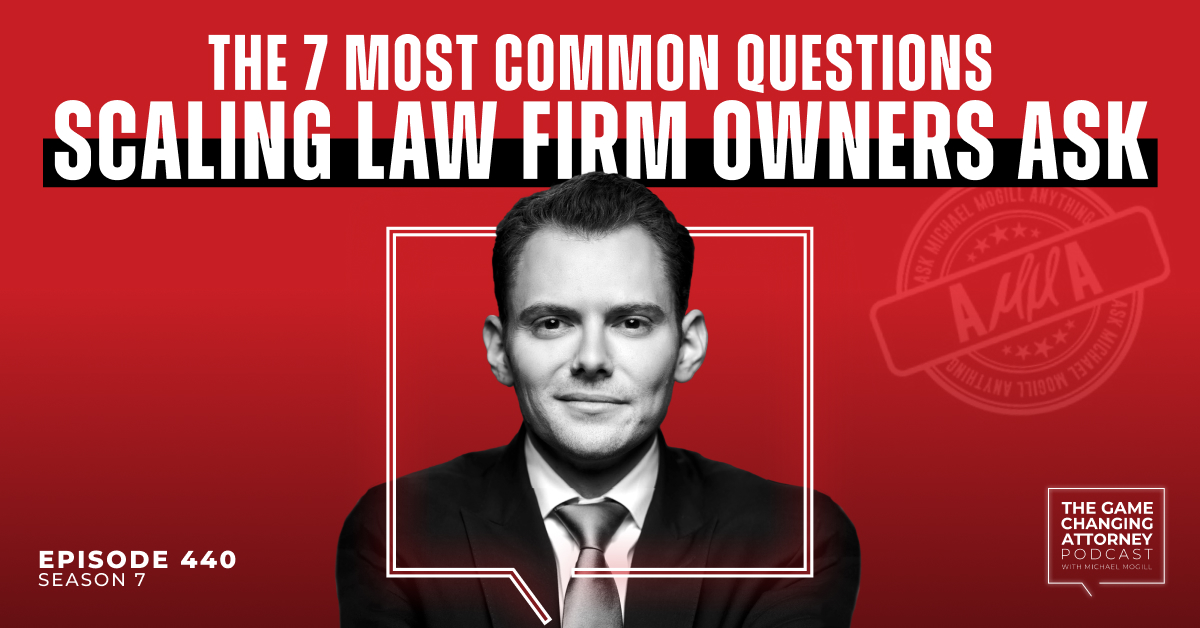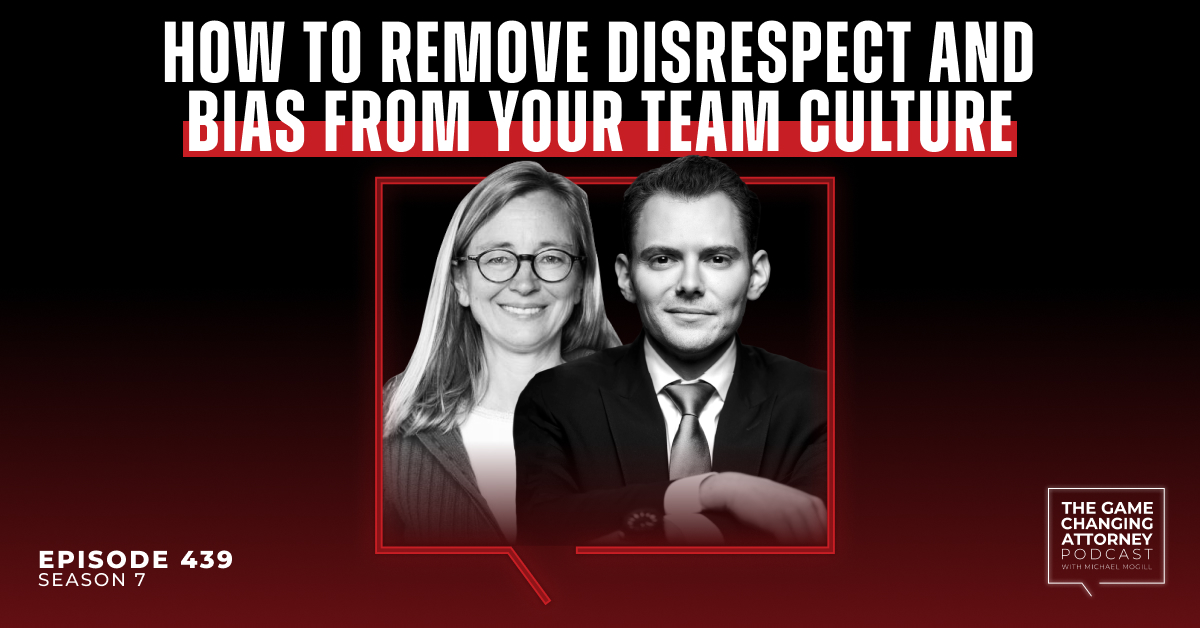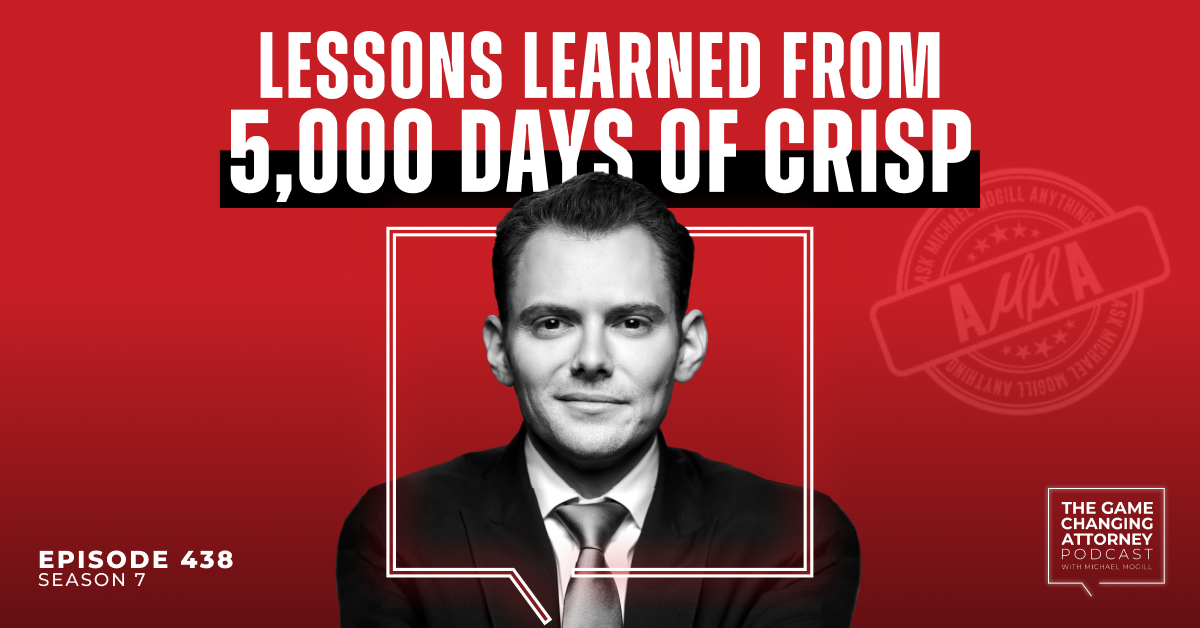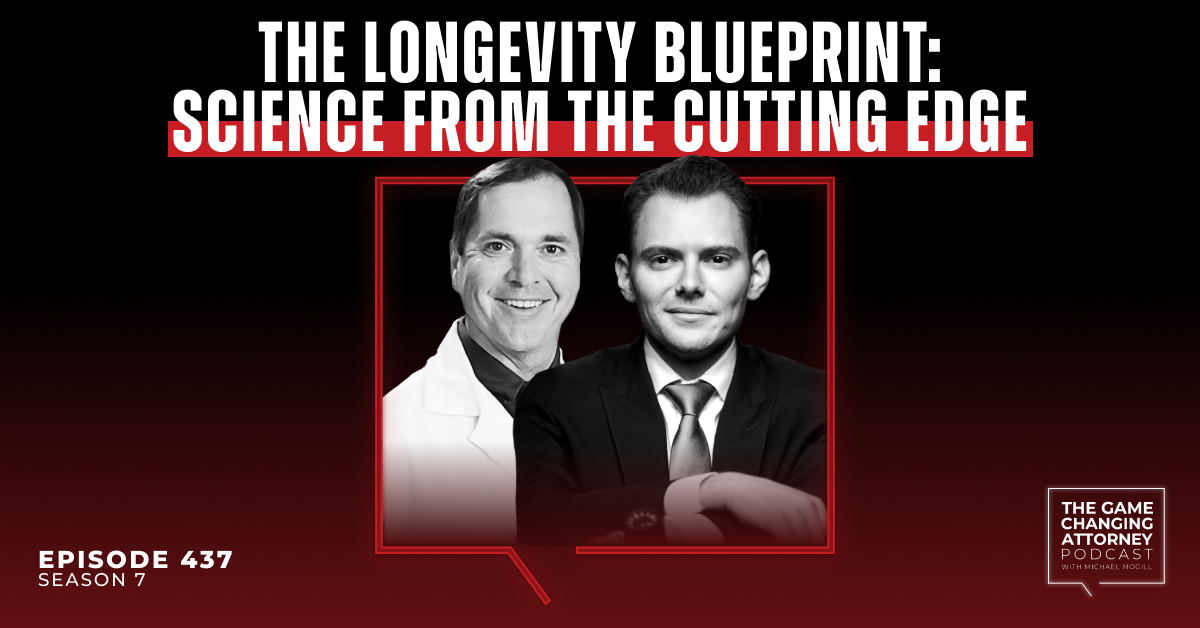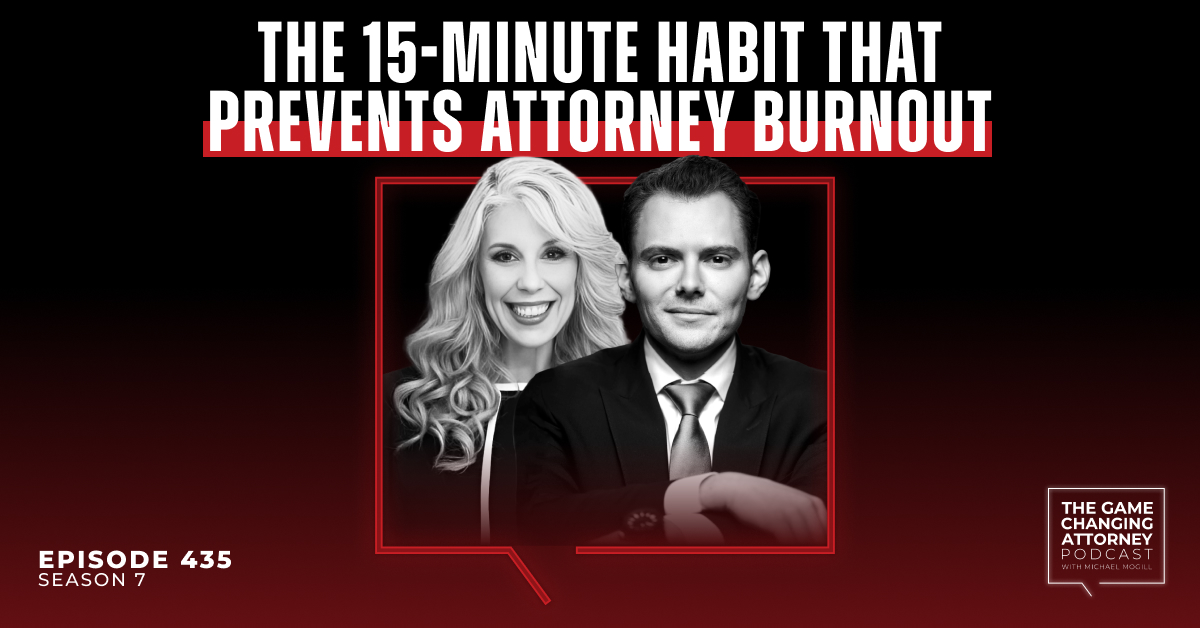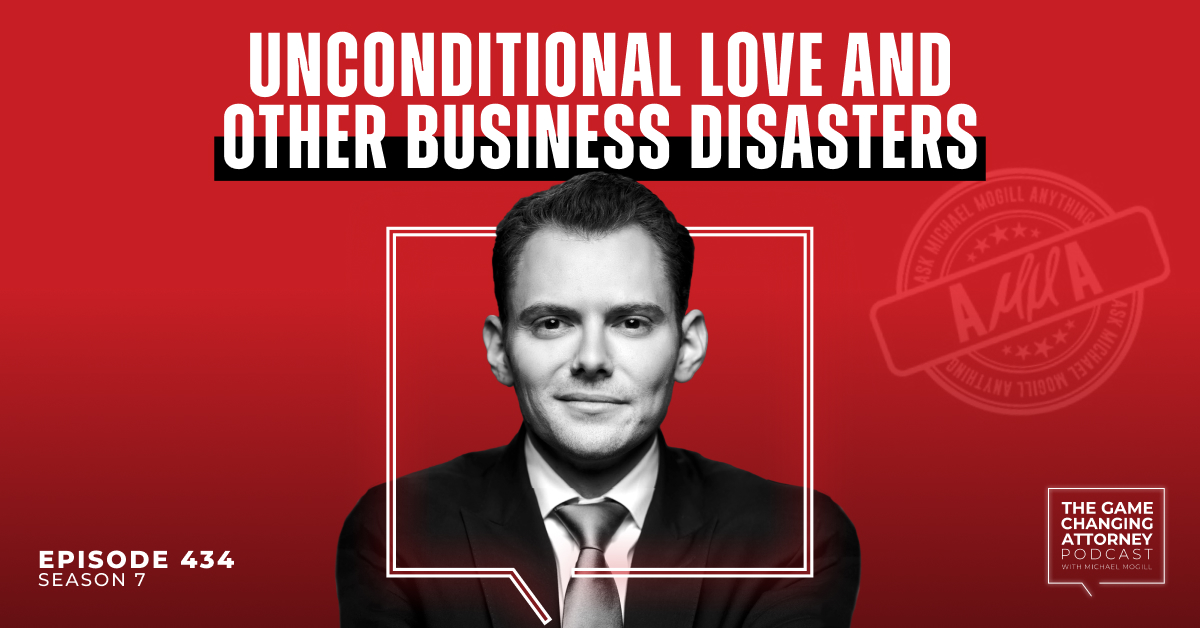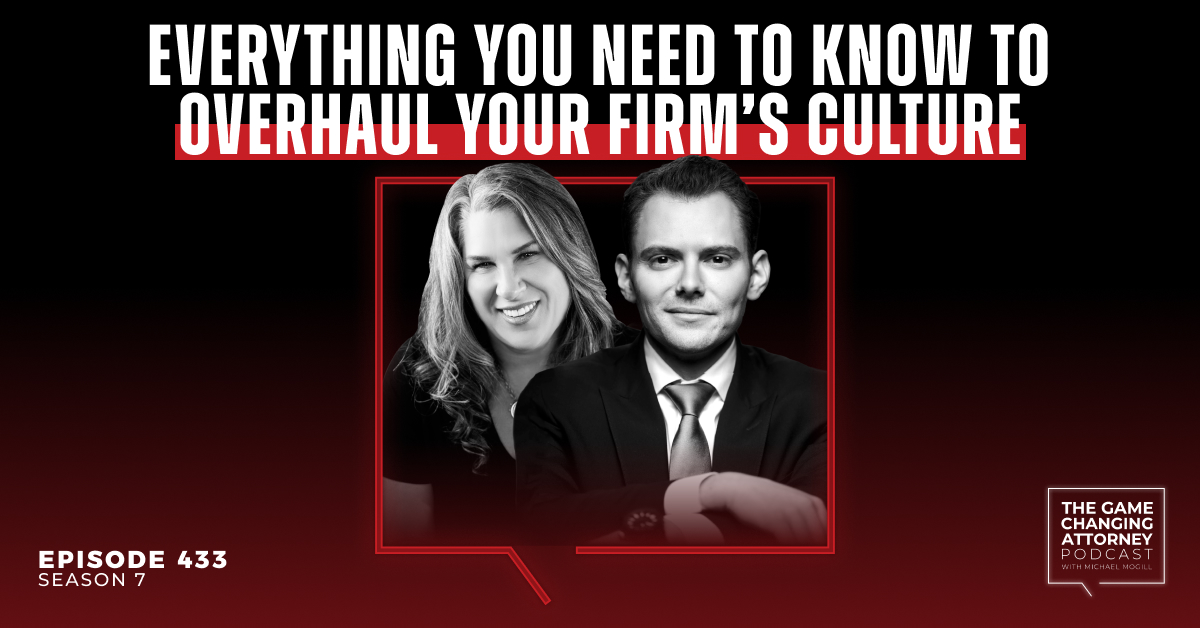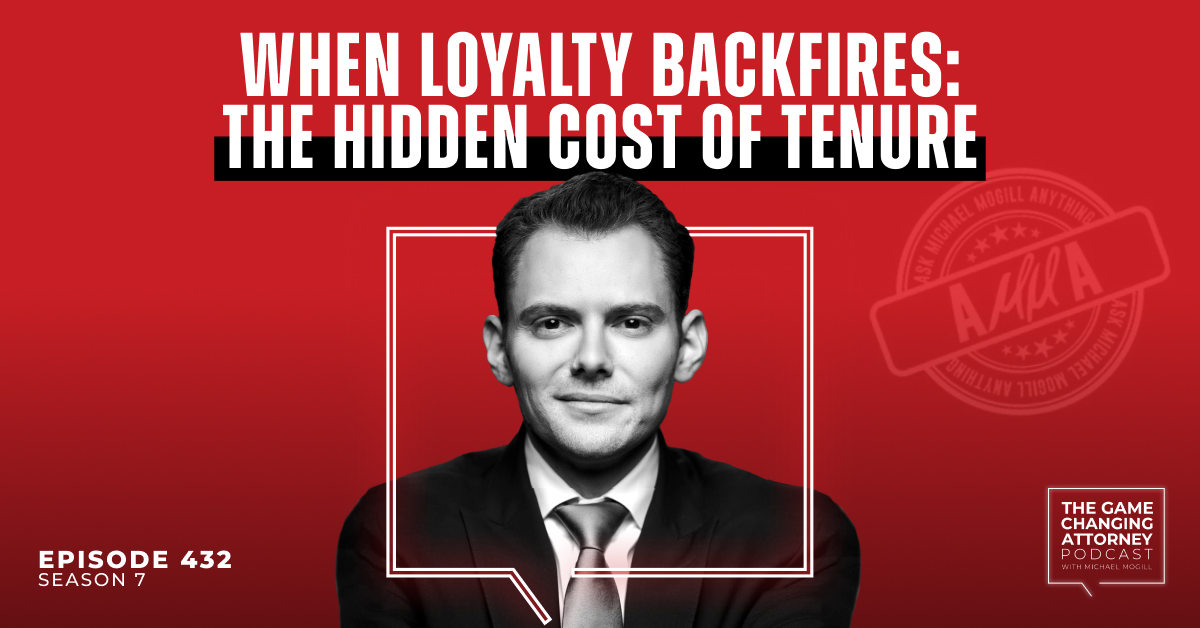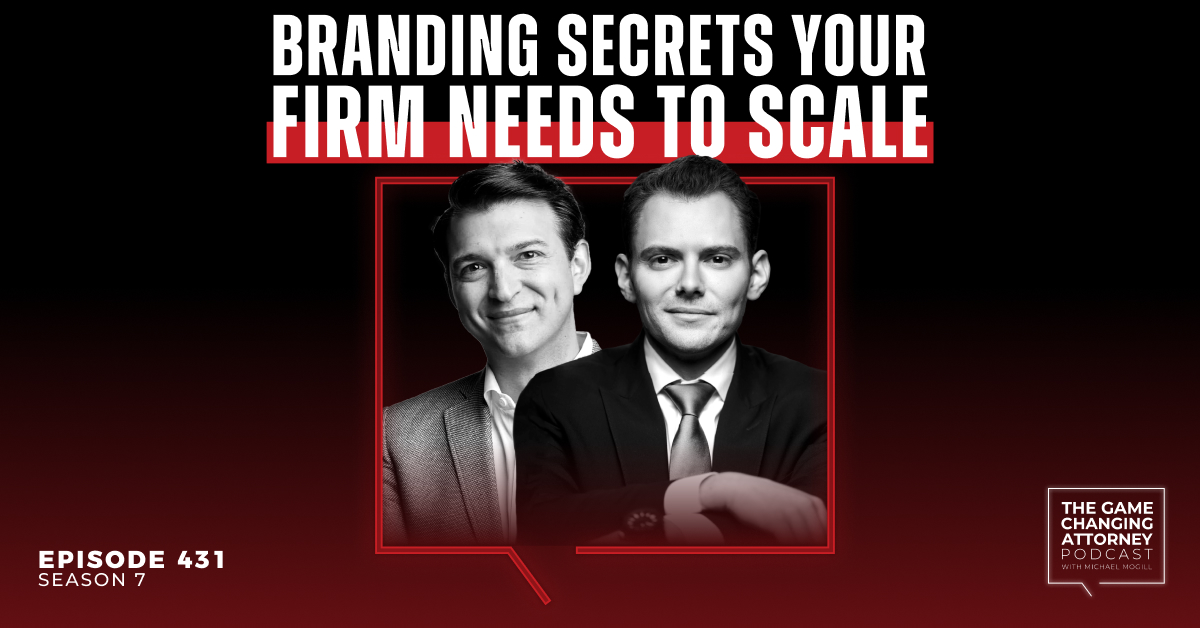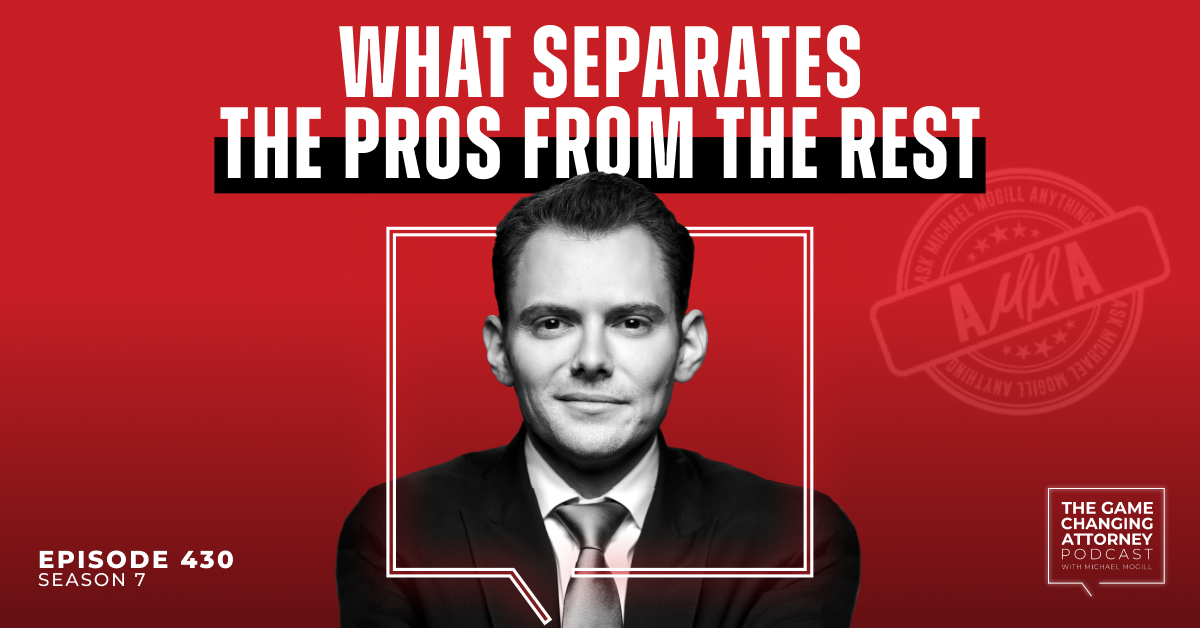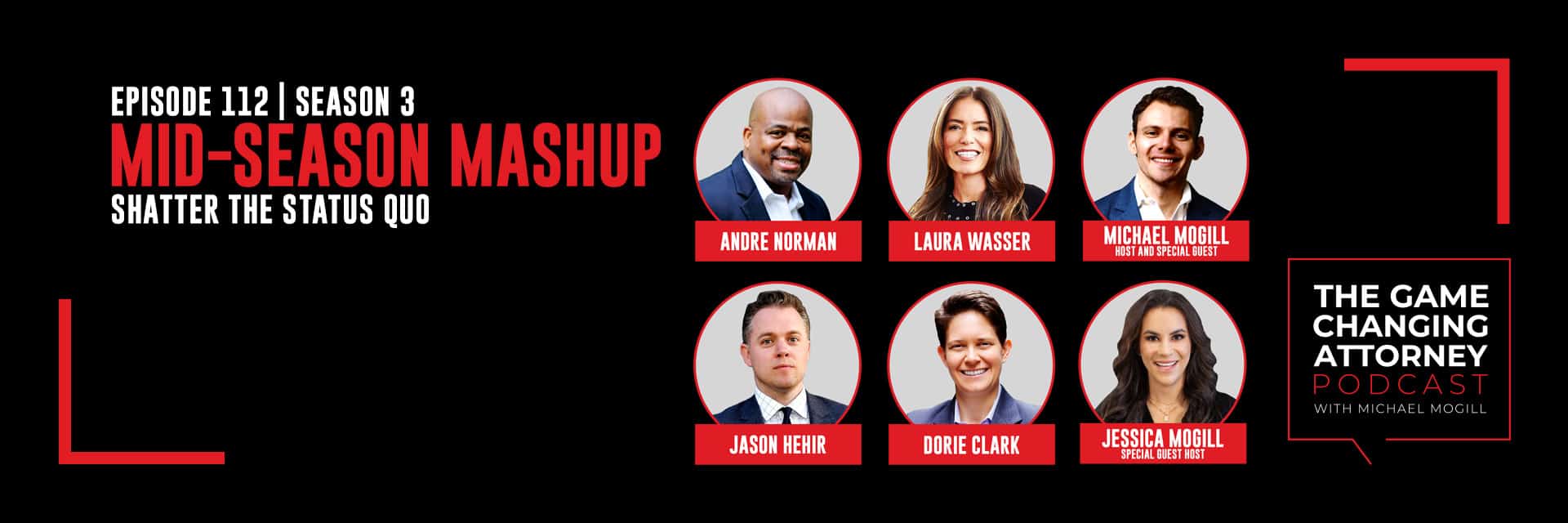
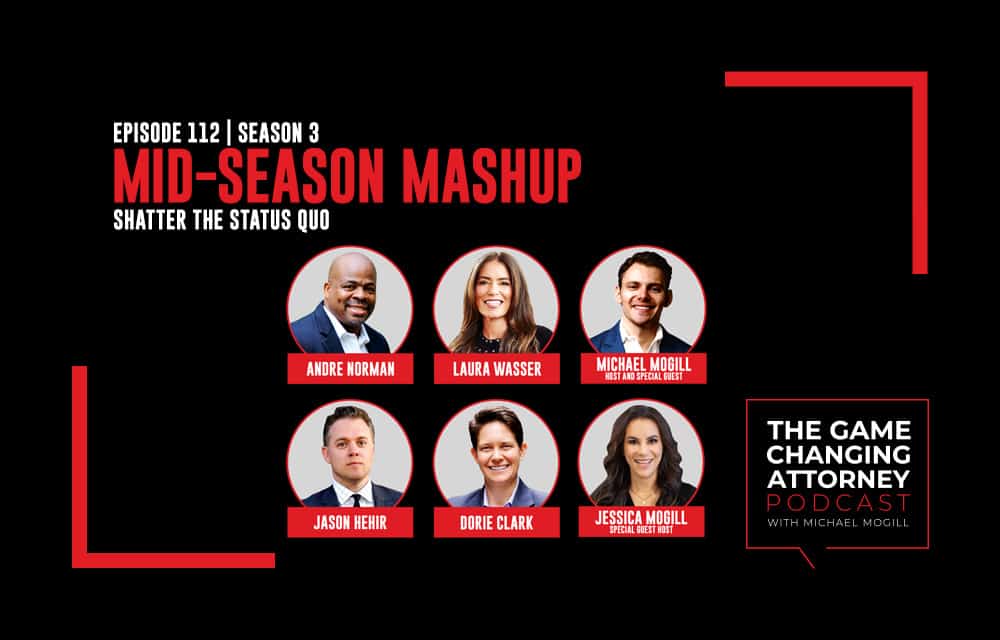
Episode 112 — Mid-Season Mashup: Shatter the Status Quo
So far on this season of The Game Changing Attorney Podcast, we’ve featured some of the biggest names in the game, explored some of the most powerful topics in law and business, and gone further than any other show in the industry — and we’re just getting started.
Before we move forward, let’s reflect on some of the top moments from this season so far.
Andre Norman, Laura Wasser, Jason Hehir, Dorie Clark, and the host himself, Michael Mogill, come together this week to share insights such as:
- Why courage is a key component to leading yourself
- How to improve yourself more and more each day
- What sets true game changers apart from those who wish to stay stagnant
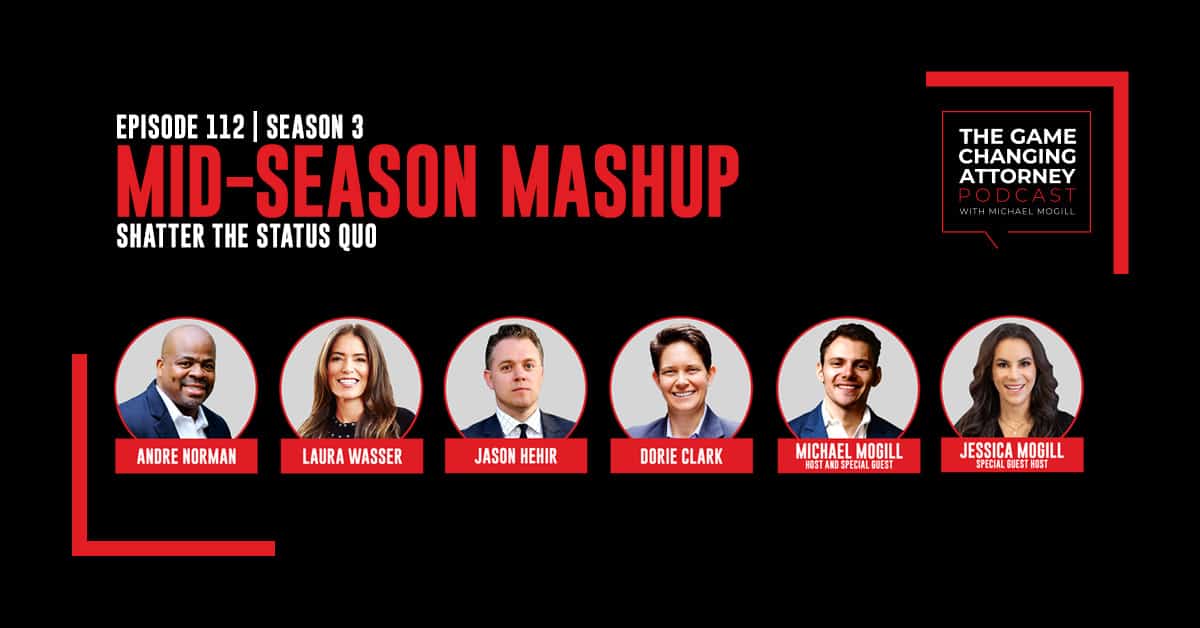
Listen & Subscribe
Show Notes:
Michael Mogill
Indecisiveness is weakness. “Decision-making, to me, is about speed. It’s not about trying to be perfect, because the people doing that are the ultimate procrastinators. They use this as a shield because they don’t think it’s perfect yet, so they hide behind it.”
Beware of the mouth-breathers. “They’re the ones who have the grandiose ideas or all of the ambition, but they don’t actually get things done. I have found that if you surround yourself with these bullsh*t artists, you will have a lifetime of frustration because nothing will get off the ground. Alternatively, if you surround yourself with people who just like to get things done, the discussions become more centered around accountability and much more productive in general.”
A recipe for failure. “If you’re looking for ways to destroy your own business, one way to do it is by being an absentee owner. If you don’t want to be there and aren’t passionate about what you’re trying to do, how can you expect your people to be? I don’t understand that. I don’t know if anyone is ever going to be more passionate than you are as a leader.”
Honesty is the best policy. “If you shed yourself of all of your secrets and anything that you’re keeping from anybody and do it right, you won’t have anything to hide. It’s amazing. So when we were building Crisp, I knew we had to do it right. Your reputation is everything, so if you use somebody the wrong way, that’s going to spread to a hundred, maybe even a thousand or more people.”
Andre Norman
The danger is real. “Maximum security prison is another world entirely. It’s scary. There’s no other way to describe it. If it’s your first time there, you should be scared to death. People get raped, beaten, stabbed, and tortured daily. When I first got there, I was terrified. They called in a caseworker who sat down with me and told me that I could make my time spent there work for me. The second she left, I knew I would sign up for my GED. But when I told my friends, they told me I was crazy — that I would be a loner, and a white gang would take advantage of that. You can’t beat the mob. So I went out to the [prison] yard instead of getting in line for my GED.”
Finding a new path. “I made a decision in prison: I was going home, I was going to Harvard, and I was going to be successful. My friends wanted to laugh at me, but I’d threatened to stab people, so no one laughed. One of them said I couldn’t go to Harvard because I was black, a criminal, and a gang member. I knew that. He kept telling me all the reasons why I couldn’t go to Harvard, and I realized I was on my own. So I stood in front of the mirror and asked myself, ‘What’s inside of me that’s stopping this dream from happening?’”
The truth of the matter. “I told young black kids who looked just like me, ‘You’re going to jail — but not because you’re black, or because you picked up a gun, or because you smoked weed. You’re going to jail because someone let you down and it hurts. You act out. At eight or nine years old, it’s cute. At 14 or 15, it’s criminal. Let me show you how to heal yourself internally, and then you can live a great life.’”
Turning over a new leaf. “Success is not a success without a successor. So if you’re not helping someone else become successful, you’re not successful either — you’re just lucky. My goal is to help people be successful. Whatever they hope to accomplish isn’t relevant to me; I just want them to get there. Stay alive and get there.”
Laura Wasser
There’s got to be a better way. “If 50 percent of marriages end in divorce, isn’t it incumbent upon us to figure out a way to do it better so that it’s not such a pain for everyone involved? We need to figure out a better way of doing it rather than the old fashioned way like we see in movies. Breakups are going to be hard no matter what, but legislatively, administratively, and financially, there has to be a better way of doing it.”
Falling in love is natural. “It’s human nature for us to fall in love. We lock into whatever’s the most secure and protected feeling we can find. After a certain period of time, though, there will always be downfalls. I’ve found that couples who figure out a way to communicate and build skills before they move in together and get married are the ones who can weather the storm. When things get bad, they can go into their toolbox and use those skills to help them.”
Stars: They’re just like us! “Celebrity cases aren’t so different from non-celebrity cases. I always say that divorce is the great equalizer. While yes, celebrities tend to have more money than the average person, they’re just not as dissimilar as one might think. The biggest change is the media and trying to keep things private for the benefit of the family. Celebrities also often have many people with whom they surround themselves, and their jobs are typically to say yes, but that’s not my job. I have to say no sometimes, even if they may not like it.”
Advice for dealing with the media. “Keep your mouth shut! Saying nothing is typically the best course of action. A lot of times they’ll misconstrue quotes or try to get you as you’re leaving the courtroom. It’s intimidating seeing 25 people walking backwards with cameras yelling questions at you.”
Jason Hehir
A never-ending learning experience. “There are no shortcuts. That comes with learning your trade, learning by mistake, and finding your voice. Filming The Last Dance was my last opportunity to delegate, coach, and put people in the right position. One of my greatest shortcomings was my lack of patience, and though it did teach me how to edit film, it isn’t a great quality to have. I’m sure that rubbed editors in training the wrong way. It made me a better leader in the long run, which is what helped make The Last Dance so successful.”
An uphill battle. “[Michael] Jordan’s people came to me after reading my 14-page outline for The Last Dance and said, ‘Do you think this can be just the footage from 1998, with no interviews, just footage?’ I told them no. That’s when I thought this documentary wasn’t going to happen, because if I said yes to them, I knew that couldn’t happen. As badly as I wanted the job, it didn’t look promising. I knew we needed current interviews to make the story work, and it needed to be about more than just the 1998 Chicago Bulls season.”
A literal captive audience. “I am acutely aware of why The Last Dance took hold culturally the way it did, because we were all so starved for original entertainment and sports. At the moment, we literally had a captive audience since people were stuck in their homes. I’m very proud of the way it was made and proud of our entire team for bringing it together. I also understand that it had an exponentially larger footprint than I think any of us could have imagined.”
A blessing and a curse. “These men and women who are icons to us are much like sharks — they’re always looking for what’s next and can never sit down and reflect. I’m not sure that that’s necessarily a good thing. It’s a gift and a curse; it’s a gift because it’s gotten them to where they are now, but it’s a curse because you want these people to have the pleasure of sitting back and reflecting on what they’ve done to reach this very moment. You want them to take pride in that and offer up wisdom as to how they made that happen.”
Dorie Clark
The four waves of your career. “1. The Learning Wave: When you’re first starting out in your career, simply taking it all in and waiting for what to do next. 2. The Creating Phase: You understand who everybody is, but it’s time to start sharing your ideas and speaking up. 3. The Connecting Mode: Know people in your company, have people know you and what your contributions are, and make a positive impact that others notice. 4. The Reaping Mode: The end state, where you’re respected in whatever you’re doing.”
99 problems. “We all have problems, but some problems are better than others. If you are a partner that’s making over a million dollars a year and you have widespread professional respect, if you disrupt yourself to work on something new, that’s a low-risk situation to be in. You can treat that with lightness and fun because it is fun. You’re stretching yourself by wanting to learn something new, but if something ‘goes wrong,’ it’s not that big of a deal. We have to keep our problems in perspective.”
A never-ending learning game. “If we keep learning and keep growing, each time around the block should get more fun because we’re able to enjoy it with fewer of the intense pressures that perhaps we faced in the initial time when we were first learning and building those connections.”
Long-term thinking necessities. “When it comes to being a long-term thinker, I think a key component many people miss is courage. It’s not easy to stand your ground, so when you work toward a long-term goal, the point is to stick with it and make it come to life, which is why so many people quit early on due to impatience. Resilience is another key component, because we don’t know what the world will look like in a few years, so sticking with it is important. The third component is curiosity, because asking questions and thinking of other options is vital to pivoting and adapting.”
RESOURCES & REFERENCES
Game Changers Summit
Jeff Bezos
Crisp
Harvard
The Wizard of Oz
Madrid, Spain
Loyola Law School
Kramer v. Kramer
The Last Dance
Ukraine
Connect with Michael
- Text directly at 404-531-7691
